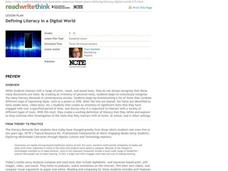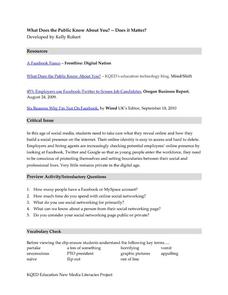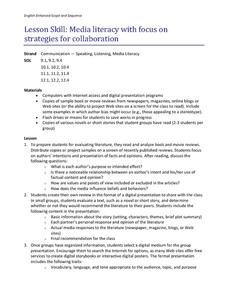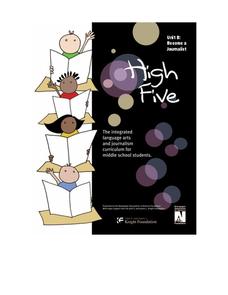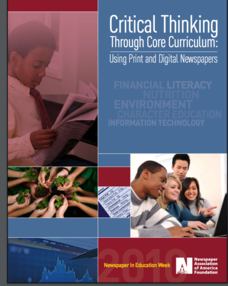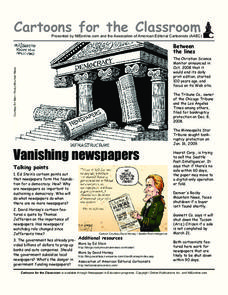Curated OER
Bias and Crime in Media
Critical thinking and social justice are central themes for this resource on bias and crime in media. The class views and discusses an incisive PSA that highlights assumptions based on race. Small groups read newspaper opinion pieces...
The New York Times
Evaluating Sources in a ‘Post-Truth’ World: Ideas for Teaching and Learning about Fake News
The framers of the United States Constitution felt a free press was so essential to a democracy that they granted the press the protection it needed to hold the powerful to account in the First Amendment. Today, digital natives need to...
American Bar Association
News Literacy Model Curriculum in Social Studies
Scholars investigate news literacy in the twenty-first century. They use technology, legal decisions, writings, and digital privacy to analyze the topic. Using what they learned, a group assignment looks into both the challenges and...
Teaching Tolerance
Media Consumers and Creators, What Are Your Rights and Responsibilities?
Teach the class to separate fact from fiction. Scholars explore the topic of fake news as they read PEN America's News Consumers' Bill of Rights and discuss the rights and responsibilities outlined in the bill. Next, they read an article...
ReadWriteThink
Defining Literacy in a Digital World
What skills are necessary to interact with different types of text? Twenty-first century learners live in a digital world and must develop a whole new set of skills to develop media literacy. Class members engage in a series of...
Curated OER
Life as a Legend: Marilyn Monroe: What is Beautiful?
Students consider the notion of beauty and what impact the media and popular culture have on it. In this cross curricular instructional activity, students examine print ads, write down and share their thoughts on them. Then students form...
Curated OER
What Does the Public Know About You? --Does it Matter?
Young people today have to be very careful with how they present themselves online. Show them the possible impact of their online activity and what employers might see when performing a basic search. The lesson provides a video clip...
American Press Institute
Newspapers in Your Life: What’s News Where?
Big news isn't necessarily newsworthy everywhere! How do journalists decide what to cover with so much happening around them? A instructional activity on media literacy examines the factors that affect the media's choice of stories to...
Southern Poverty Law Center
Analyzing How Words Communicate Bias
Words are powerful ... can your class choose them wisely? Scholars evaluate news articles to discover the concepts of tone, charge, and bias during a media literacy lesson. The resource focuses on recognizing implicit information and...
English Enhanced Scope and Sequence
Media Literacy with Focus of Strategies for Collaboration
Introduce your class to literary analysis with a series of activities that has them examine book and movie reviews. Groups then draft their own review of a text, select a digital medium, and craft a presentation.
Media Smarts
Making Media for Democratic Citizenship
Pupils analyze global issues. For this video podcasting lesson plan, pupils research Internet and print sources regarding selected global development issues. Pupils plan and create video podcasts that feature their research findings.
Online Publications
Become a Journalist
Explore the newspaper as a unique entity with a detailed and extended unit. The unit requires learners to consider the newspaper's role in democracy, think about ethics, practice writing and interviewing, and examine advertising and news...
Curated OER
Now That's Beautiful!
Your class experiences dozens of messages about beauty every day by reading magazines, watching movies, and listening to the radio. Have them analyze society's view of beauty in groups after discussing several resources, including Dove's...
Newspaper Association of America
Critical Thinking through Core Curriculum: Using Print and Digital Newspapers
What is and what will be the role of newspapers in the future? Keeping this essential question in mind, class members use print, electronic, and/or web editions of newspapers, to investigate topics that include financial literary,...
Curated OER
Information Overload: Looking at News
How do events reported in mainstream newspapers, on television news, blog posts, and social network sites differ? Ask your class to investigate the way the same news item is presented in the many information sources available. Groups...
Curated OER
Cartoons for the Classroom: Vanishing Newspapers
What is happening to our newspapers? In the context of the current trends of media and the ever-declining print news industry, this handout includes two political cartoons for pupils to analyze, both created by artists working for...
University of Virginia
Student Page: Uncle Tom's Cabin and American Culture
History sleuths read articles for and against Uncle Tom's Cabin, examine visual images, print responses, and multi-media tomitudes to better understand the impact of Harriet Beecher Stowe's novel on American culture prior to the Civil...
Curated OER
Coast-to-Coast Book Design-Part 1: What is a book?
In this first of four lessons on book design, students are introduced to the vocabulary of book design through the use of bookwalks and a non-linear PowerPoint presentation in game-show (Jeopardy!) format.
Curated OER
Digital Animal Presentations
First graders explore animals and digital presentations. They chose an animal and identify the physical traits of the animal. Students classify the animal using the physical traits. They create a presentation about their chosen animal.
PBS
Journalism in War Time: What Does the Public Need to Know?
A viewing of the documentary War Feels Like War, launches an exploration of the importance of accurate and comprehensive war reporting. Groups investigate various news agencies and assess the factors that influence their stories. A...
Curated OER
Culture Creation vs. Culture Consumption - Finding Voice Through Digital Storytelling
Ninth graders explore the power of media in culture and Gandhi's philosophy of nonviolence. In this nonviolence and media lesson, 9th graders analyze Gandhi's nonviolent methods for social change and discuss the media's power to create...
Curated OER
Our Computers, Ourselves: Imagining the Digital Lives of Authors and Characters
The guiding question for this lesson is "Do computers and their contents shape who we are?" Open with a selection of Apple's commercials to introduce stereotypes and people's relationships with their computers. Then, read the attached...
Curated OER
Postcards For Your Ears
Here is a great way to have your students make audio postcards to share by recording a message on the computer. They write and revise an appropriate message about an object from home, choose a background, and font colors for the...
Film English
iDiots
Mobile phones have become an integral part of many people's lives. Examine the role and impact of technology through a short video and related activities. Pupils share what they use their phones for before viewing the film. Class members...






